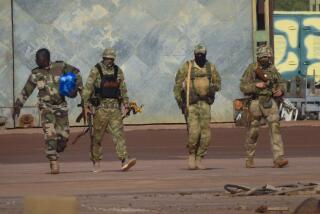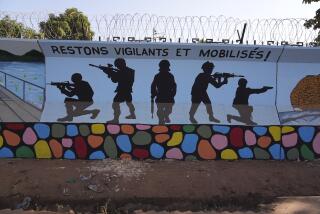Libyan rebels accused of targeting blacks
About a dozen African men stood lined along a hallway of the courthouse in the eastern city of Benghazi. The men were suspected of being mercenaries fighting on behalf of Libyan leader Moammar Kadafi and had been rousted from their homes in the morning, turned in by residents responding to a rebel campaign urging them to report “suspicious people.”
We are construction workers, one of the men said, pleading his innocence to a Times reporter visiting the courthouse, which now serves as the headquarters of the rebel government.
But the interview was abruptly ended and the group of Africans were led away to detention by Muhammed Bala, who described himself as a security officer for the rebel government.
“We’re out looking for mercenaries every day,” Bala said.
Across eastern Libya, rebel fighters and their supporters are detaining, intimidating and frequently beating African immigrants and black Libyans, accusing them of fighting as mercenaries on behalf of Kadafi, witnesses and human rights workers say.
In a few instances, rebels have executed suspected mercenaries captured in battle, according to Human Rights Watch and local Libyans.
The rebel-led provisional government in Benghazi denies mistreating suspected mercenaries, though it acknowledges that it is detaining some for questioning. It says it has given human rights representatives access to detainees.
But rebel fighters and bands of gunmen who looted government weapons depots are reportedly instigating their own detentions and beatings.
Kadafi has long used mercenaries, many of them from sub-Saharan Africa, to help enforce his rule.
As the country has descended into violence in recent weeks, witnesses in the capital,Tripoli, and other cities have reported mercenaries suppressing protests and indiscriminately shooting at civilians.
But Libya also is home to thousands of immigrant laborers as well as black Libyans. In their zeal, human rights officials and witnesses say, rebel fighters in some cases have arbitrarily killed some mercenaries and in others cases failed to distinguish between them and non-combatants.
In the eastern city of Beida and in other areas under rebel control, several accused mercenaries have been killed recently, said Peter Bouckaert, emergencies director for Human Rights Watch in Libya. There have been “widespread and systematic attacks” on Africans and black Libyans by rebels and their supporters as they attempt to root out suspected mercenaries, he said.
“Thousands of Africans have come under attack and lost their homes and possessions during the recent fighting,” Bouckaert said in an interview Friday in Benghazi. “A lot of Africans have been caught up in this mercenary hysteria.”
He called the rebel fighters and gunmen “ad hoc military and security forces.”
The provisional government says it is struggling to control thousands of armed men fighting under the banner of the “revolutionary movement.” There is no central military leadership or chain of command, only undisciplined street fighters.
“This is a revolution. We’re starting from zero,” said Mustafa Gheriani, an official with the provisional government in Benghazi, who said detainees are well-treated. “We don’t have structures in place to deal with these issues.”
As many as eight Libyans who fought with pro-Kadafi forces in a battle for the oil hub of Port Brega were shot or stabbed to death by rebels Wednesday, according to Mustafa Abdulrahim, a rebel who fought there and said he disapproved of executing prisoners.
Jalal Elgallal, a Benghazi businessman who is part of the transitional government, said he had no information about the eight pro-Kadafi fighters reported slain in Port Brega. But he acknowledged that killings might have taken place.
“If they were killed, I’d be glad that it was only eight,” he said. “And I can say that when we have them in our hands, they are treated properly.”
After Kadafi came to power, he began training fighters to create an unofficial army he could use to foment unrest in the region and that he could call upon in a crisis, Libya experts said. Some signed on for the arms and training, including rebel forces among the Tuareg Berber nomads from Chad, Niger and Mali. But the primary motivation was money, with thousands of dollars often paid up front.
“In the existing environment of Africa, of war and poverty, why not? You get weapons, you get paid, you live the life of ease, to a certain extent,” said Mansour El-Kikhia, chairman of the department of political science and geography at the University of Texas at San Antonio. In exchange, “they are his backbone,” he said.
But their presence during the last 30 years has also made black Africans targets within Libya, El-Kikhia said. When suspected mercenaries are caught, they are almost always hanged or otherwise executed, he said, leading to the deaths of some innocent black immigrants.
Bouckaert, who witnessed the fighting in Port Brega, said Human Rights Watch is investigating credible reports that several African or black Libyan men being treated in a Benghazi hospital recently were abducted by armed men.
He said he was promised access Friday to the men detained at the courthouse in Benghazi, as well as to pro-Kadafi fighters captured in the Port Brega battle. He said other men he has interviewed in custody have told him they were treated well. Bouckaert said the men were released after “extensive discussion” with authorities.
Khaled Sayah, a spokesman for the rebels’ “military council,” said about 150 men were being held at several secret locations in and around Benghazi. Some of them are suspected mercenaries from Niger or Chad, and even Libya, he said.
Gheriani of the rebels’ provisional government said, however, that he had been told that none of those captured were from other countries.
Bouckaert said Human Rights Watch has not confirmed a single instance a foreign mercenary having been brought in to fight in eastern Libya. He said many black men accused of being mercenaries are actually black Libyans or Africans who have been living in Libya for years.
He said some of the 160 Libyan pro-Kadafi fighters captured in street fighting in Beida last month probably were guilty of killing civilians, he said. They were released under a tribal agreement, he said.
But many innocent Africans and black Libyans have faced detention, beatings or intimidation while being accused of accepting money to fight for Kadafi.
Six men from Ghana who were turned over to rebels by a taxi driver after a fare dispute were detained as mercenaries recently and later released, Bouckaert said.
Africans recently interviewed in Benghazi said they had been threatened, beaten and driven from their homes by gunmen calling them mercenaries.
Yusef Ghawys, a construction worker from Ghana, said he and several other workers from Somalia, Ethiopia and Niger were forced from their living quarters by men armed with knives who ordered them to leave the country.
“Our lives are in danger,” Ghawys said. “They said they’d kill us.”
Ghawys and hundreds of other Africans were camped out at the Benghazi port this week, trying to board a ship leaving the country. Crewman on ships transporting Chinese, Tunisian and South Asian workers to safety refused to take the Africans.
Gheriani said only 10 to 15 detainees are held at any time, with most released after questioning by courthouse prosecutors. He declined to say how many have been held as accused mercenaries after questioning or what will happen to them. There is no functioning judicial system here yet.
He said detainees have access to food, water, medical care and human rights groups.
“We’re not feeding them caviar, but they eat what we eat,” he said.
Elgallal said the provisional government is trying to protect Africans and black Libyans from false accusations and harassment.
“Just being black or African is not a crime,” he said.
Times staff writer Raja Abdulrahim in Benghazi and Molly Hennessy-Fiske in New Orleans contributed to this report.
More to Read
Start your day right
Sign up for Essential California for news, features and recommendations from the L.A. Times and beyond in your inbox six days a week.
You may occasionally receive promotional content from the Los Angeles Times.







